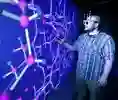



Want to create the next big thing in tech? This is where you start.
Software engineering is essential to the smooth running of modern life. Safe, reliable and robust software is critical from the apps and digital tools we use every day to developments such as driverless cars.
This degree specialises in the techniques that you need to design, develop and deploy software that delivers value to users and controls the world around us. The skills, experience and tech expertise you’ll gain will put you in high demand when it’s time to enter the job market in this fast-moving industry.
About this course
Gain a rock-solid grounding in the fundamentals of computing, information science and informatics on this British Computer Society accredited degree. Develop the skills to write code, create and manage software projects using the latest agile development methods. And learn about test-driven development and DevOps.
Then specialise in the areas that interest you most – ending with a major individual software project. Previous topics include a wind farm simulation, modelling a self-driving car and an app to find and join live, location-based events.
You’ll learn within industry-standard facilities, including high-performance workstations, gigabit networking, 3D printers, robots, a 3D immersive cube, motion capture, AR, VR and MR.
Take a full paid placement year – which gives you outstanding tech industry experience – as a recognised part of your degree.
You could compete in international events like the Microsoft Imagine Cup. Or rise to the challenge of creating a computer game over a weekend in our Three Thing Game. Plus, benefit from our strong links with companies like EA, Sony and Black Marble with frequent talks by experts in the trade.
Software skills that give you a harder edge.
Module options
Our five undergraduate Computer Science courses share the same compulsory modules in the first year. This gives you a foundation of knowledge across the whole subject area and the chance to explore what really interests you. You're then better placed to choose your modules in the later years of our BSc Computer Science, or switch to a different pathway to specialise in games programming, software engineering, robotics or AI.
Filters
Programming Portfolio
Gain the practical knowledge to design, implement and test algorithms. The module uses lectures to deliver concepts, a practice lab to apply the programming concepts learnt by developing programs to solve problems. You will take part in hands-on practical assessments, which will enable you to acquire extensive programming skills in an industry standard programming language. We will support you whether you are new to programming or have existing skills.
core
40 credits
Algorithms and Data Structures
Start to think like a computer. This module explores logic, data storage and algorithms with the use of practical demonstrations and activities. Operating in parallel with programming-focused modules, we will develop a toolkit of key concepts from a theoretical (non-code) perspective, facilitating a better understanding of these fundamentals. Topics to expect include pseudocode, state machines, essential keywords, common data structures, sort algorithms and search algorithms. You will learn methods to analyse and compare algorithms and their constituent parts in order that you may better design, evaluate and develop effective, efficient and performant software solutions.
compulsory
20 credits
Computational Thinking
This module, Computational Thinking, is essential for developing computer-based solutions. This module will enable you to develop your knowledge and understanding of the key mathematical underpinnings of computer science, to aid you in problem solving and programming. The development of your competence in logic, mathematics and statistics will also provide evidence of your numeracy and more advanced skills and is valued by employers.
compulsory
20 credits
Architectures, Operating Systems and the Cloud
In this module you will explore the fundamental properties of computers that allow them to execute programs. You will learn about how computers are made to work in hardware and simulation (virtual machines). A collection of virtual machines is a cloud, and this module allows you to get experience with the development of your own cloud using appropriate platforms.
compulsory
20 credits
Professional Development
Employers want much more than discipline-specific skills. This module sets you up to grow your professional skills and awareness, when working both individually and as part of a team. Develop your appreciation of the challenges within the sector, and how technology can help to solve worldwide issues. Begin a personal portfolio that you will add to over your degree. Work as part of a team to produce a design prototype, demonstrating your personal professional development. Through researching your discipline, you will understand the range of career roles available and what you need to do to progress in them.
compulsory
20 credits
Design, Develop, Deploy
Our flagship software development module. You'll use contemporary software development tool chains to experience authentic software creation and deployment, applying techniques such as agile project management, test-driven development and continuous integration and deployment.
core
40 credits
Databases and Networks
You'll be introduced to the core components of any online information system that drives the information we use today. Learn how modern applications fetch data from servers and how that information can be stored and retrieved efficiently. You will solve a real-world problem by developing a networked database.
compulsory
20 credits
User Interfaces and Experience
Any software or hardware used by humans needs to put human understanding at its core. Digital products succeed or fail by how well the designer understands the ability of a human to use the product, or the experience that using the product provides. You'll take a scientific and engineering approach to understanding, developing and evaluating effective interfaces and experiences for users.
compulsory
20 credits
Advanced Programming
In this module you will explore advanced techniques in programming as well as building an understanding of how high level objected-oriented languages are executed on a modern CPU. C++ will be used extensively, but we with reflect back on C#, as well as throwing in some assembly language.
compulsory
20 credits
Our facilities


Watchlist
Dr John Dixon
Course overview
2 mins
Rand Nessif
Unsame Stories
2 mins
See our incredible labs
Course Highlight
2 mins
Featured academics
You’ll be taught by talented researchers whose specialist areas include computational science; computer gamification; dependable intelligent systems; robotics and artificial intelligence; and simulation and visualisation.

Brian Tompsett
Lecturer
Brian is an experienced computer scientist and software engineer with a career spanning over 50 years. He has worked within industry and academia in the UK and the US. He leads the Software Engineering degree programme.

Prof Yiannis Papadopoulos
Professor
Professor Papadopoulos pioneered the development of one of the state-of-the-art techniques in the area of dependability analysis (HiP-HOPS). He’s also developing technologies for self-certification of cyberphysical and autonomous systems.
Entry Requirements
What do I need?
This course is currently available through Clearing, which means our entry requirements are a bit different to what they would normally be.
At Hull, you're a name not a number. During Clearing, we look at all of your qualifications and experience, not just your academic grades. We may be able to offer you a place whatever your situation. Get started by completing our eligibility checker, and find out immediately if you could study at the University of Hull.
Have questions? Our admissions team will be happy to help.
Fees & Funding
How much is it?

Future prospects
You’ll be on the fast track to chartered IT professional status as this degree is accredited to the maximum available level by the British Computer Society (BCS).
Graduate careers include software developer, mobile app developer, software engineer, video games developer, IT security specialist and web developer.
Many of our graduates go on to work for industry giants such as Sony, the BBC, Dell and Fujitsu. Some of our Computer Science graduates go on to work for not-for-profit businesses and public sector organisations. Others go on to further study with an MSc or PhD, and some have gone on to set up and grow their own tech businesses.
Become part of the next generation of futuremakers
Like what you've seen? Then it's time to apply.
The standard way is to apply through UCAS. This will give you the chance to showcase your skills qualities and passion for the subject, as well as providing us with your academic qualifications.
Not ready to apply yet?
Visit our next Open Day, and see all that the University of Hull has to offer. Talk to our lecturers about your subject, find out what university is really like from our current students, and take a tour of our beautiful campus and amazing facilities.
You may also be interested in...
Software Engineering is ranked 5th in the UK for learning resources. National Student Survey (NSS) 2025, HEIs only.
90% employability (Computer Science) UK domicile full-time first degree leavers; Higher Education Graduate Outcomes statistics, for the academic year 2022/23, published by the Higher Education Statistics Agency June 2025.
All modules presented on this course page are subject to availability and this list may change at any time.